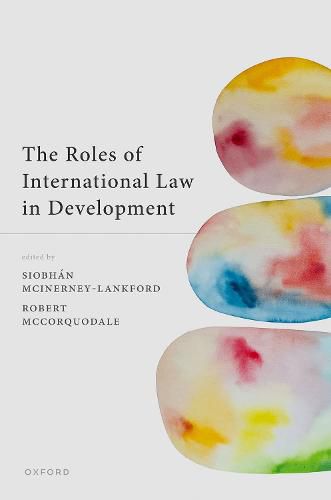Readings Newsletter
Become a Readings Member to make your shopping experience even easier.
Sign in or sign up for free!
You’re not far away from qualifying for FREE standard shipping within Australia
You’ve qualified for FREE standard shipping within Australia
The cart is loading…






The Roles of International Law in Development provides an in-depth analysis of the relationship between public international law and development. Unlike the existing body of literature on public international law, this book investigates how international law and development interact, and evaluates the significant and multifaceted roles that international law plays in development. Bringing together a collection of perspectives from contributors working across multiple fields, the chapters explore the relevance and applicability of international law to particular sectors and issues implicated in development activities. This includes chapters on human rights, gender equality, race and discrimination, environmental law and climate change, forced displacement and migration, and international trade and investment. They analyse how international law rules and processes can influence procedural and substantive aspects of development policies as these regulate various forms of financial support, trade, technical assistance, and policy dialogue. They also explore whether, and how, development could be more effective and yield more equitable and sustainable outcomes if the relevant and applicable rules of international law were better understood, consistently incorporated, and appropriately applied to development activities. A foundational premise of this book is that development policy and practice should be grounded more systematically in international law, rejecting the notion that development law and policy comprise a 'self-contained' regime or that development is undertaken in a legal vacuum. The proposed systematic grounding in public international law would in turn help uphold international legal accountability in the context of development activities.
$9.00 standard shipping within Australia
FREE standard shipping within Australia for orders over $100.00
Express & International shipping calculated at checkout
The Roles of International Law in Development provides an in-depth analysis of the relationship between public international law and development. Unlike the existing body of literature on public international law, this book investigates how international law and development interact, and evaluates the significant and multifaceted roles that international law plays in development. Bringing together a collection of perspectives from contributors working across multiple fields, the chapters explore the relevance and applicability of international law to particular sectors and issues implicated in development activities. This includes chapters on human rights, gender equality, race and discrimination, environmental law and climate change, forced displacement and migration, and international trade and investment. They analyse how international law rules and processes can influence procedural and substantive aspects of development policies as these regulate various forms of financial support, trade, technical assistance, and policy dialogue. They also explore whether, and how, development could be more effective and yield more equitable and sustainable outcomes if the relevant and applicable rules of international law were better understood, consistently incorporated, and appropriately applied to development activities. A foundational premise of this book is that development policy and practice should be grounded more systematically in international law, rejecting the notion that development law and policy comprise a 'self-contained' regime or that development is undertaken in a legal vacuum. The proposed systematic grounding in public international law would in turn help uphold international legal accountability in the context of development activities.